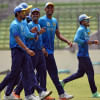A woman umpire and a click-hungry media

An unsavoury truth that's been proven through decades of advertising and media is that women sell, be it as the centre of positive news, controversies, or simply as objects to be ogled by the (largely male) gaze of the masses. Due to women universally being that field onto which any and all opinions can apparently be thrown, it is easy to grab most people's (in this case, news readers') attention with the keywords of "woman," "female," "girl," etc. This truth is also at the crux of the recent controversy regarding Shathira Jakir Jessy umpiring a Dhaka Premier League match on April 25.
The backdrop
A day after the match, it was reported that both the teams involved, Mohammedan Sporting Club and Prime Bank Cricket Club, were unhappy with the appointment of a female umpire. This is according to Bangladesh Cricket Board (BCB) umpires' committee chairman Iftekhar Ahmed Mithu's conversation with this daily. He said, "They [team officials] made comments regarding their unhappiness. They did not make the complaint to me but did so with CCDM [Cricket Committee of Dhaka Metropolis]."
Since Mithu's comments, both teams have denied lodging any such complaints. Prime Bank came out with a press release, expressing its disappointment with the news and iterating that it believes in progress and is respectful towards all genders, castes, and religions. Meanwhile, an official of Mohammedan said, "We didn't say anything against playing under a female umpire. Mohammedan didn't complain in this regard. It's totally concocted."
However, the concern that officials of both teams did admit to having was relating to Jessy's experience as an umpire. Now, she has indeed umpired international matches since her debut in the profession two years ago. And in March, Jessy, alongside three other Bangladeshi women, was added to the International Cricket Council's (ICC) development panel of umpires for the first time ever. However, prior to April 25, she had no experience as an on-field umpire in any premier league matches. As such, the teams' representatives were wary of her debuting at that crucial point of the DPL.
Later on, in an April 28 Bangladesh Sangbad Sangstha (BSS) report, managers of both teams conveyed their satisfaction with Jessy's umpiring, with the Prime Bank team's manager saying, "What made us worried was that she was not experienced enough to handle a big game like this. There was no delay in the match. But we, two teams, were big-budget [teams], so we wanted an experienced umpire for this match. We didn't have any written complaints about the appointment of the umpire."
Not only this, senior players of both teams, Mushfiqur Rahim and Mahmudullah Riyad, congratulated Jessy for a job well done. And the umpire herself expressed her surprise about the incident and refused to accept it since she maintains good relations with the cricketers.
Given that all parties involved during the match seem practically chummy with each other, how is it that this issue has heated up Bangladesh's social media discourse over the last couple of days?
Where the problems began
Unfortunately, once BCB official Mithu's comments were out in the open, various media outlets took it upon themselves to distort the entire narrative of the matter.
What started as an already misleading statement of "two DPL teams being unhappy with the appointment of a female umpire for their match" was taken further off-course by the media. Certain outlets worded their headings in such a way—"Mushfiqur, Mahmudullah's teams refuse to play under female umpire" being one example—as to indicate that the nation's most seasoned cricketers were misogynistic in their behaviour on the field. Naturally, it took no time for netizens to divide themselves in support of and in opposition to the teams' presumed misogyny. Haha reacts flowed as freely as angry ones.
So why this muddying of the storyline? In short, the move from print to an online landscape demands clicks and not readership. Every word, every phrase, every photo, and every heading is curated to satisfy one question: will people click on this?
It is no surprise, then, that these click-hungry outlets are able to shamelessly sensationalise news to the point of distorting the public's perception of the subjects in question.
Now, since it seemingly was Jessy's relatively limited experience as an umpire which concerned the teams' officials regarding her appointment for the DPL match, we also know that their reservations were not strong enough to compel them to lodge a formal complaint against Jessy's umpireship over said match. So why did the media jump the gun and so strongly push the gender discrimination narrative?
In his most recent comment to BSS on April 28, BCB umpires' committee chair Mithu said, "It's absolutely a false news that the players refused to play under a female umpire. But the club officials have a little reservation, considering Jessy's experience to officiate a match in a high-voltage DPL game. That's just it." Unfortunately, as per a quote above, his own words on April 26 first lent fuel to this fiasco. And for media outlets nowadays to publish something dreadfully misleading, it doesn't take much.
Why the misogyny narrative?
Of course, the match in question was not without its moments of conflict. Although Mushfiqur Rahim was dismissed after a terrific catch by Mohammedan's Abu Haider Rony, video recorded by the Prime Bank side showed that Rony had his foot over the rope when taking the catch. But since the match was not televised, there was no third umpire to call upon. As such, the words of the fielders and the opposition captain were the deciding factors for the on-field umpire's decision. Such a setting naturally gives way to tension, especially towards the umpire—in this case, a woman with supposedly limited experience in the role. And though the match ended well for Jessy, things took a turn for the unexpected once the media took over.
As sports journalist Syed Faiz Ahmed pointed out in his article in Desh Rupantor, the handling of this issue by the media is a perfect example of how the public's focus is often diverted from matters of actual significance. In this case, the real controversy could have been about why the BCB did not arrange for TV umpires during the DPL. But coming back to that unsavoury truth, one can easily deduce why the narrative of a woman being belittled would garner much more attention from social media inhabitants (feminists, misogynists, and others) than one which would only attract sports fans.
A more vigilant readership
Ideally, I would advise my professional counterparts to not lie by omission in their curation of news. But I feel it would be easier to urge readers to exercise more awareness. During these times of fake and manipulated news, it's crucial that readers depend on more than salacious headings and funky nutshell posts. To uncover the logical truths behind the bait, one must read the fine print.
Afia Jahin is a member of the editorial team at The Daily Star.


 For all latest news, follow The Daily Star's Google News channel.
For all latest news, follow The Daily Star's Google News channel. 











Comments